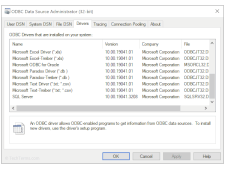ODBC
Stands for "Open Database Connectivity."
ODBC is an API that helps an application interact with many types of databases in a standardized and consistent way. It allows an application to use the same software code to transfer data to and from databases using multiple database management systems, regardless of which DBMS software the database uses. ODBC was first introduced by Microsoft and the SQL Access Group in 1992 and has served as a standard for interoperability ever since.
Applications interact with a database through an ODBC driver, which translates the application's standard database calls into each database's unique language. The driver is also responsible for translating data returned by the database into an ODBC-compliant format and sending it to the application through the ODBC API. For example, an application can use the same commands to query a MySQL database, a Microsoft Access database, and an Oracle database through each of their ODBC drivers. The application's developer can support a variety of databases without writing separate calls for each system.
Each separate database implementation uses a separate driver. Software utilities called ODBC Driver Managers help users configure each driver's settings and manage which ones they have installed. In addition to first-party drivers, users can install third-party drivers that provide access to databases that lack official ODBC support. Users can also install ODBC drivers for other kinds of databases that don't rely on DBMS software — for example, Excel spreadsheets and CSV text files — to help their applications interact with data from other sources.
NOTE: ODBC is language-independent and is available in multiple programming languages. A similar API, Java Database Connectivity (JDBC), standardizes calls for database-connected Java applications.
 Test Your Knowledge
Test Your Knowledge